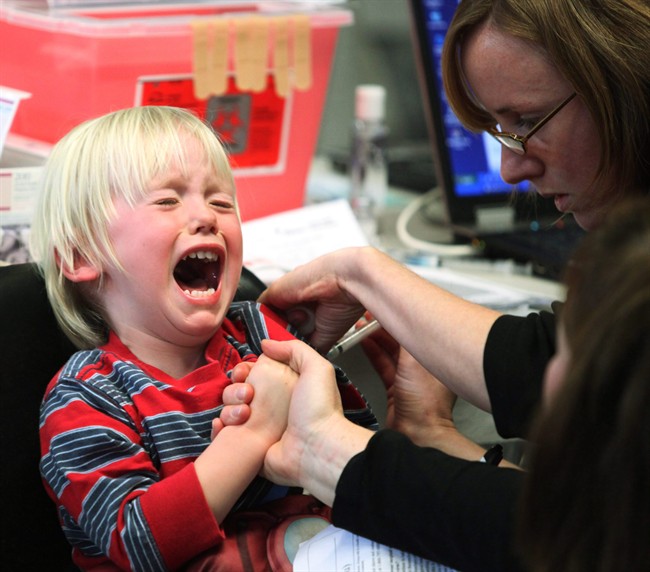TORONTO – First-born children are more likely to be taken to hospital when they have reactions to childhood vaccinations than their younger brothers and sisters, a new study shows.

The difference in hospital visits post-vaccinations was greatest in the first two sets of shots babies get, at two months and four months.
In fact, first-born children were 70 per cent more likely to be taken to hospital in the days after getting their four-month shots than were their younger siblings, the researchers reported.
The study, by Ontario researchers, can’t say for sure what is behind the higher rates of hospital visits after first-born children are vaccinated. But the authors suggest the anxiety of first-time parents could well be playing a role.
READ MORE: What to expect from this year’s flu season
“That’s potentially one part of it,” acknowledged Dr. Joanne Langley, a pediatric infectious diseases specialist at Dalhousie University in Halifax who was not part of this study.
“First-time parents aren’t as experienced. And as they gain experience, they become better and better able to read their child.”
“But at two months, they’ve only known this little person for two months. And so their ability to respond to things and interpret signals is going to be different than it will be later on or when they’ve had more children.”
The study, which is published in the journal PLoS One, was written by scientists from the Ottawa Hospital Research Institute, the Institute for Clinical Evaluative Sciences and Public Health Ontario, the province’s public health agency.
- Posters promoting ‘Steal From Loblaws Day’ are circulating. How did we get here?
- Video shows Ontario police sharing Trudeau’s location with protester, investigation launched
- Canadian food banks are on the brink: ‘This is not a sustainable situation’
- Solar eclipse eye damage: More than 160 cases reported in Ontario, Quebec
READ MORE: What caused a whooping cough epidemic? Scientists blame parents
The authors said there is also a possibility that a biological effect could be contributing to the higher rates of post-vaccination hospital visits for first-borns. First children may have different responses to vaccines than younger siblings as a manifestation of the so-called hygiene hypothesis, they suggested.
A number of studies have reported that children who have older siblings are less likely to develop asthma and allergies. It’s thought that may be because their immune systems are exposed to a wider range of challenges sooner because of their birth order.
“There are some really good biological and environmental hypotheses that could explain this,” said first author Steven Hawken, a biostatistician at the Ottawa Hospital Research Institute. He said he and his co-authors were curious about whether the hygiene hypothesis might extend to the response to vaccinations too.
The study used anonymous medical data from Ontario to trace hospital visits by children in the days after they would have received two-month, four-month, six-month and 12-month vaccinations.
The researchers looked at all children born in Ontario between April 1, 2006 and March 21, 2009. Nearly 275,000 children got two-month vaccinations in that time period.
The authors suggest doctors should take time to inform parents of what kind of symptoms they might see and when those symptoms are likely to appear when babies are given vaccinations.
For instance, reactions are common after the first dose of measles, mumps and rubella vaccine, given at 12 months. But unlike earlier vaccines, where babies may have symptoms in the first few days after getting a shot, the symptoms after the MMR vaccine are seen a week or two later.
READ MORE: Should flu shots be mandatory for health care workers?
Langley said more focus needs to be placed on getting doctors to help parents anticipate post-vaccination reactions.
“It takes time to provide that education,” she said.
“I don’t think everybody is doing it in an excellent fashion yet. But that’s our goal.”



Comments